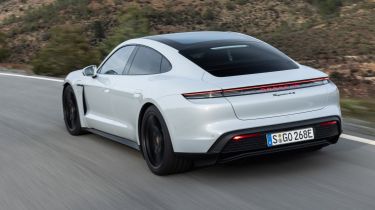Porsche Taycan: running costs & insurance
It’s not cheap to buy, but rock-bottom Benefit-in-Kind bills make the Taycan a hugely tempting company car
| Insurance group | Warranty | Service interval |
|---|---|---|
| 48-50 | 3yrs/unlimited mileage | 2yrs/20,000 miles |
At face value, the Porsche Taycan is a very expensive car that isn’t as cheap to run as the majority of EVs. However, shift your perspective to view it as a super saloon along the lines of the petrol-powered BMW M3 or even Porsche’s own Panamera, and things end up looking a lot more appealing.
For starters, the Taycan benefits from all the same savings as other electric cars such as zero road tax and rock-bottom company car tax bills. Topping up an EV at home is much cheaper than filling a car up with petrol – a full charge of the Taycan’s 97kWh battery pack will set you back around £30 or less at the average electricity rate – however, using public rapid chargers could cost just as much as petrol, or perhaps even more.
Porsche Taycan insurance group
It’ll come as little surprise that the Porsche Taycan line-up sits between insurance groups 48 and 50. This means it'll be costly to cover, even if you’ve got a long history of safe driving with no claims, but that’s just the same for any other car with comparable performance and value. That said, these premiums are unlikely to deter anyone who’s capable of forking out for a Taycan in the first place.
Warranty
The Porsche Taycan is sold with a three-year/unlimited-mileage warranty as standard, while the battery is covered by a separate, eight-year/100,000-mile warranty.
Servicing
The main service for the Taycan is due every two years or 20,000 miles, which is a much more generous service interval than you’ll enjoy on a petrol-powered Porsche Panamera, Bentley Continental GT or the like.
Road tax
As an electric car with zero tailpipe emissions, the Porsche Taycan is currently zero-rated for Vehicle Excise Duty (VED, better known as road tax) and escapes the London Congestion Charge, but both exemptions will come to an end in April 2025.
Depreciation
Our experts predict that the Taycan saloon should retain between 42-51% of its initial value after a typical ownership period of three years and 36,000 miles. Prices are far from low, though, so you should still be prepared to bid farewell to several thousands of pounds. In comparison, the Tesla Model S should hold on to between 47-49% over the same period, while the Audi e-tron GT will retain only 39-42%.

